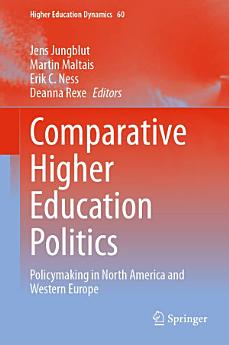Comparative Higher Education Politics: Policymaking in North America and Western Europe
About this ebook
The book covers five key aspects of policymaking, namely the politics of governance as well as funding reforms, the role of interest groups, policy diffusion, and policy framing. These aspects are explored using a unique comparative design that combines comparisons within as well as between regions, and among the five key aspects of policymaking. The conceptual framework is anchored in approaches from institutional theory, namely sociological and historical institutionalism.
“This rare book coherently focuses on the same critical challenges that higher education faces in a changing global and national environment. These include vital governance and finance issues and how these are framed and contested by different organizations and interest groups as well as state actors. Within a broad institutionalist framework that reflects the tensions between historical university and national legacies on the one hand and regional and global influences on the other, the authors focus on policymaking in Western Europe, Canada, and the US. This is an engaging and creative endeavor, a must-read for scholars and policymakers alike.”
Francisco O. Ramirez, Graduate School of Education Stanford University
“This is a real achievement that will contribute to the development of research in politics of higher education policy, finance, and economic development. It is timely in an era when higher learning is increasingly salient to national policy, interest groups, and supranational bodies such as the EU. The focus on Canada, the US, and Europe frames a comparative approach to a competitive higher educational policy arena that has not received systematic study."
Sheila Slaughter, Louise McBee Institute of Higher Education, University of Georgia
“This fills a gaping hole in research on the politics of higher education. In bringing together research perspectives from governance studies with comparative public policy as well as scholars from Europe and Northern America, this volume will serve as an important reference point for a rapidly growing research field. The exceptionally high quality of editorship is documented by the fact that the chapters are convincingly subsumed under five sub-themes. In short: A must-read for any researcher and student interested in understanding the political foundations of higher education.”Marius R. Busemeyer, Department of Politics and Public Administration, University of Konstanz
About the author
Martin Maltais is professor of financing and education policies at Université du Québec à Rimouski (UQAR). As proximity manager, he is a key player in the development of higher education and digital policies in Québec (Canada). Author of several papers, reports and communications concerning education and higher education policies and funding as well as distance education, he was chief of staff and political advisor to four Ministers of Higher Education and Education in Québec over the last ten years.
Erik C. Ness is professor of higher education and graduate coordinator in the Louise McBee Institute of Higher Education at the University of Georgia. He teaches and conducts research on higher education politics and policy. His recent work examines research utilization—the extent to which policy makers rely on research evidence to craft policy—in the adoption and implementation of various state higher education policy initiatives. Ness earned a BA in political science at North Carolina State University, an MA in comparative and international education at Loyola University Chicago, and a PhD in education policy from Vanderbilt University.
Deanna Rexe is adjunct professor in the Faculty of Education and an affiliated scholar with the Centre for the Study of Educational Leadership and Policy at Simon Fraser University, and vice president academic at Assiniboine Community College. Her research examines the relationship between decision contexts and higher education policy choices. As a practitioner and academic leader, she is interested in service, policy, and governance interventions to support increased access and success in higher education.







